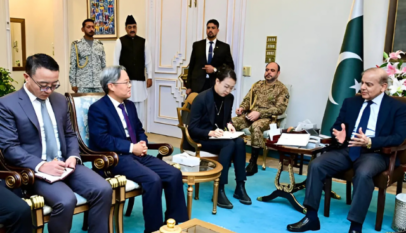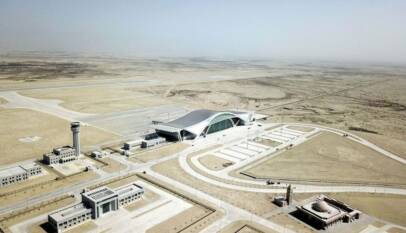China remains Pakistan’s reliable partner in all spheres
Over the past 69 years, the strategic partnership between China and Pakistan has remained solid and kept growing despite the fluctuating international situation. China-Pakistan relations present a model of good neighbourly friendship, a pillar of regional peace and stability, and a benchmark for international cooperation on the BRI as Pakistan has been the recipient of BRI flagship project, i.e. the CPEC. Both countries have firmly supported each other on many forums and stand shoulder to shoulder in difficult times. Amid the outbreak of COVID-19, bilateral cooperation and support are commendable. On the other hand, the US is clearly not happy with China’s emergence as an economic and regional power. From supporting India to opposing CPEC, the US has been trying to hurt China’s status at any cost. However, it is high time for the policymakers to understand US covert intentions to hurt Pakistan China friendship. There is a dire need that government pay heeds to strengthen bilateral cooperation by materializing all opportunities offered by CPEC.
Today marks 69 years of our diplomatic relations with China. In these 69 years, the ‘all-weather’ comprehensive, strategic partnership has achieved many milestones and has emerged as a model diplomatic relationship which carries extraordinary goodwill amongst the people of Pakistan for China and vice versa.
The Pakistan-China relationship is above partisan politics in Pakistan, and there is a consensus across the political spectrum, civil society and the armed forces on our strategic alliance and friendship with China.
This relationship has evolved into what is called in China as “batie”, which means ‘iron brothers’ – signifying the unbreakable bond in Pakistan-China relations. However, this relationship has been a process of joint contribution, extensive consultation and mutual respect, which has now culminated into the China-Pakistan Economic Corridor. This process has involved unwavering support to each other’s core interests.
China has been Pakistan’s voice in the UNSC, has unequivocally supported Pakistan when Modi annexed Kashmir, and has consistently supported Pakistan’s security perspective.
Pakistan was the first Muslim country to recognize the Peoples Republic of China. In July 1971, Pakistan facilitated the then US National Security Advisor, Dr Henry Kissinger’s secret visit to China, which led to the historic opening to China, laying the foundation for US-China rapprochement and the first official visit by an American president to China. Pakistan has also consistently supported the ‘One-Country, Two-Systems’ policy of China, safeguarded Chinese sovereignty and territorial integrity in Hong Kong, Tibet, and Xinjiang (China’s vulnerable “soft-underbelly” which borders Gilgit-Baltistan).
More recently, in 2013, Pakistan became recipient to the flagship project of the Belt and Road Initiative, the China-Pakistan Economic Corridor. The mammoth infusion of energy, infrastructure and socio-economic investments and grants from China has re-branded Pakistan’s image in the international community, boosted its geo-political relevance in the region and flagged it as a conducive destination for international investors to invest their money in exchange for profitable returns.
As the Covid-19 pandemic took the world by storm and China was scapegoated by some Western countries, the Pakistan Senate passed two resolutions unanimously that appreciated China’s medical support to Pakistan, and condemned the vilification of China for political ends. Pakistan’s president made a solidarity visit to China on March 16-17, to reaffirm our support to China, a gesture which was appreciated by Beijing.
As both countries celebrate 69 years of a unique state-to-state and people-to-people bond, it is an opportune moment for reflection, learning, and preparing for the post-Covid 19 world order and the way forward for Pakistan-China relations. The pandemic has accelerated great power competition, and the US policy of containment of a rising China has been given a new impetus. This means that Pakistan needs to prepare, revisit and apply it’s diplomatic levers accordingly and astutely, as the pre-Covid-19 status-quo will no longer hold.
American author Daniel Markey, in his paper published on April 8, ‘How the United States Should Deal with China in Pakistan’, says Washington should focus on three aspects of China’s relationship with Pakistan: i) China’s impact on regional stability with respect to US withdrawal in Afghanistan; ii) China’s growing political influence; and iii) the geo-political implications of the China-Pakistan defense partnership. Markey’s policy prescriptions are an apt reflection of Washington’s thinking, which is demonstrative of an approach of taking the fight to China and in countries where it has goodwill and a robust presence, which some analysts view as a precursor to a New Cold War.
Pakistan needs to understand that Washington’s engagement with it is tactical, whereas Washington’s engagement with Delhi is more strategic. The National Security Strategy document of the Pentagon that President Trump unveiled on December 18 of 2017 is the strategic compass of how the US plans to engage geopolitically with the rest of the world. In it’s subsection on South Asia Strategy, it categorically says that the “US will support India’s leadership in the Indian Ocean”, where Gwadar is also located, and lists the two primary threats to US interests as China and Russia.
On May 15, 2020, US Senator Thom Tillis presented an 18-point plan to “hold China accountable”. This bill, which will likely win bipartisan support from the Senate and the nod of the White House, seeks to create a Pacific Deterrence Initiative that will enhance military ties and sales of offensive military equipment to US partners like India, Taiwan and Vietnam. This renewed, institutionalized policy of Washington is at the cost of Pakistan’s core interests, arming Modi’s India, and also at the cost of Pakistan and China’s shared interests in the region. On the contrary, China’s engagement with Pakistan is consistent, long-term, and strategic.
Islamabad’s policymakers must understand that, notwithstanding their positive engagement with the West, notably the US, their principal, reliable partner in development and defence remains China.
What Islamabad should be doing is: i) unequivocal political ownership of CPEC, by high-level visits of CPEC projects, meeting and listening to problems faced by CEOs of those projects and ensuring that those problems are solved; ii) the CPEC Authority should be strengthened and empowered with regular and institutionalized supervision and support of the PM so that avoidable delays do not happen; iii) counter and end the perception that Pakistan is reviewing and reassessing some CPEC projects, through a robust and coordinated media strategy; iv) materialize Gwadar as a regional hub of connectivity along the lines of Hong Kong or Dubai, rather than just another port of Pakistan, enabling it to have attractive incentives for foreigner investors that cut through the bureaucratic red-tape, with direct supervision and attention from the PM’s office.
Sixty-nine years later, the resilient Pakistan-China relationship presents new opportunities for building a peaceful and prosperous region and, above all, a better life for 220 million Pakistanis.
Chinese Ambassador highlights significance of Third Plenary Session for China-Pakistan cooperation
The Third Plenary Session of the 20th Central Committee of the Communist Party of China ha…












